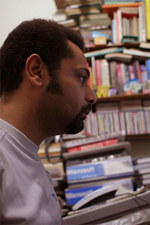by Natasha Tynes | Oct 22, 2007 | Everyday me!, Weblogs
For some reason, I mentioned my blog this morning to the husband during our morning commute. His reaction was something along the lines of the following: people may have forgotten about you in the blogging world by now. Of course, he was referring to my sporadic blogging, which is becoming less and less by the day. I got defensive and started justifying the reasons why I’m not paying too much attention to this side of my life anymore. I went on and on, much to his chagrin, until I decided to change the topic.
As lame as it may sound, I have been really busy. Work is consuming most of my time and then there are after-hours activities. From Spanish class to creative writing classes, I have been swamped. There are also cultural activities and social obligations. I can’t keep track of anything. I’m writing lists and marking my calendar. I have even started using an on-line calendar, which sends reminders to my mobile phone! I’m not sure why I can’t keep up with anything anymore. Is this what being in your thirties is all about?
To de-stress, I have been riding my bike in the woods — an activity that merits a whole post perhaps sometime later this week. As a result, biking and other outdoor-related activities are consuming a big chunk of the little spare time I have, time that probably would have been dedicated to blogging. I will do my best to pay more attention to Mental Mayhem. I just need to regain a bit more control of my life, which has been moving at a crazy, yet enjoyable pace.
by Natasha Tynes | Sep 27, 2007 | Media watch, Weblogs
For those interested in the development of the Arab Blogosphere, here is an interview I did with Egyptian blogger Wael Abbas, who just last month was named last month winner of the prestigious Knight International Journalism Award. I enjoyed talking with Wael. He was very eloquent and quite determined to expose corruption and human rights violations in Egypt. You can read the full interview on the International Journalist’s Network. Here is an excerpt:

For 33-year-old Egyptian Wael Abbas, the Web log is not merely a personal journal; he has a specific mission. He sees his blog as an avenue for freedom of speech in a country that has relatively little of it.
Legal harassment of independent journalism is common. According to the Egyptian Organization for Human Rights, there were 85 criminal cases against the press from 2004 to 2006. It was in this atmosphere that Abbas launched his Egyptian Awareness blog, available at http://misrdigital.blogspirit.com [Arabic].
He says he took it upon himself to expose human rights violations in Egyptian society and shed light on issues of corruption and torture, among others. In an interview, Abbas told IJNet that what compelled him to start his blog was "the need for real, transparent, independent media that cover stuff often neglected by mainstream media." Armed with a video camera, Abbas sees video blogging as a way to silence skeptics of his reporting. "I focused on images and video footage so that no on can discredit my work," he said. He uses colloquial Egyptian Arabic on his site to appeal to a younger generation that might find traditional reporting "boring."
by Natasha Tynes | Sep 5, 2007 | Jordan, my nation, Media watch, Weblogs
As are the majority of bloggers in the Jordanian blogosphere, I was shocked and dismayed by the treatment of the father of a fellow blogger at Prince Hamza Hospital. It really beggars belief. However, this is not the main reason for this post. I’m blogging about this to highlight the effect of the blogosphere in a country that has been used to government-dominated media outlets for the last few decades. You see, word spread about this inhumane treatment through the blogosphere and it has already found its way into traditional media. Addustour daily published the story and it was picked up on a news website called Rum. Hopefully, this will bring still more attention and prompt concerned officials to act.
When I was growing up in Jordan, I never had such an outlet. We heard of similar heart-wrenching stories occurring to friends and family but we felt completely helpless. There were instances when we could not do anything to highlight the predicaments caused by an inefficient public system or institution. Things are no longer the same. There is now a way to spread the word even if traditional media outlets shy away from reporting what they may regard as "daring" stories or incidents that might air the country’s dirty laundry.
I’m glad that I’m witnessing this first-hand. The effect of the blogging phenomenon should never be underestimated. After all, bloggers are getting international recognition. Just last week, outspoken Egyptian blogger Wael Abbas was named as one of the recipients of the prestigious Knight International Journalism Award. Yes the blogs are here to stay, despite what others might think.
Update: Blogger Who Sane reports that he has been contacted by officials from the Health Ministry following his post and the reactions that followed.
Upon republishing the story in Addustour Daily, (Batir, I owe you my life), senior officials at the Ministry of Health contacted me yesterday and confirmed that the newly appointed Minister of Health, Dr. Salah Al Mawajdeh, sends his regards and is personally very concerned about this issue and has given direct orders to start an investigation lead by the Head of Internal Auditing Department at the Ministry of Health, Dr. Azmi Al Hadidi, who called me and visited my dad at the hospital yesterday (September 5th, 2007) and assured us that the investigation will prosecute those who have caused this ordeal.
by Natasha Tynes | Jul 18, 2007 | Weblogs
I got the following message from my Dubai-based friend this morning:
I got the habit of checking your website every now and then. However, recently i haven’t been able to as it gives me a weird message: "Network Error (tcp_error) A communication error occurred: "Operation timed out". The Web Server may be down, too busy, or experiencing other problems preventing it from responding to requests. You may wish to try again at a later time. For assistance, contact Customer Support."
When I asked about it, they told me it has been blocked in Dubai. Do you know or can do anything about it? 7aram it’s a nice site. By the way, people in Media City can check your site since their communication is provided by DU, the rest of Dubai’s communication is provided by Etisalat who are blocking the site.
Can anyone confirm this? I really can’t see the reason for my blog being blocked in the UAE or anywhere else for that matter. I rarely blog about controversial issues. Most of the material in my blog reads like a personal journal. Could it just be a technical error? Can anyone shed light on this?
Update: So far I’ve received two responses from Dubai residents, one confirming the message above, the other saying that this blog can be accessed normally through Etisalat. Who knows?
by Natasha Tynes | Dec 10, 2006 | Weblogs
 I just finished reading a profile on Arianna Huffington, the founder of the Huffington Post, which, according to London’s Observer, is one of the world’s most influential media outlets. The profile sheds light on Huffington’s strong and vocal personality, one which attracts the attention of media moguls, Hollywood celebrities and politicians. Here are some excerpts of the profile:
I just finished reading a profile on Arianna Huffington, the founder of the Huffington Post, which, according to London’s Observer, is one of the world’s most influential media outlets. The profile sheds light on Huffington’s strong and vocal personality, one which attracts the attention of media moguls, Hollywood celebrities and politicians. Here are some excerpts of the profile:
To watch Arianna at work is to see a human blog in action. Each air kiss seems like the click of a computer’s mouse, each handshake a link to another potential blogger in an ever-growing network of movers and shakers. No wonder she has prospered in the world of the web. At the Time lunch she meets Hollywood star Emilio Estevez. Click. Later, at the Council on Foreign Relations, the glamorous Hungarian-American chess grandmaster Susan Polgar eagerly presses her business card into her hand. Click. By evening she is at CNN headquarters where top anchor Paula Zahn greets her with a girlish exclamation: ‘Arianna!’ Click
And there’s more:
She embraces some of the mockery, turning it deftly on itself. At pretty much any public appearance, she rapidly disarms the crowd with a self-mocking reference to her accent. ‘Everyone on this panel has an accent,’ she says at the CFR, where she shares a stage with a Russian businessman, an Italian neuroscientist and a Canadian journalist. ‘It’s great for me to be not the only person with an accent.’ The crowd laughs and is instantly won over.
Read the whole profile here. Hat tip: [Euroarabe]
by Natasha Tynes | Sep 30, 2006 | Jordan, my nation, Media watch, Weblogs
 The Washington Post‘s new on-line feature "PostGlobal," which is being moderated by David Ignatius and Fareed Zakaria, is hosting a debate this week on the replacement for Kofi Annan as UN chief. As I blogged previously, Jordan’s prince Zeid bin Ra’ad is among the candidates to replace Annan. Though he has an outside chance, he’s well qualified, having earned his BA in Poli-Sci at Johns
The Washington Post‘s new on-line feature "PostGlobal," which is being moderated by David Ignatius and Fareed Zakaria, is hosting a debate this week on the replacement for Kofi Annan as UN chief. As I blogged previously, Jordan’s prince Zeid bin Ra’ad is among the candidates to replace Annan. Though he has an outside chance, he’s well qualified, having earned his BA in Poli-Sci at Johns
Hopkins and a PhD in history from Cambridge. He served as Jordan’s
deputy permanent representative before his current permanent representative post. As a UN chief, Prince Zeid would most likely put the Middle East crises on the global agenda. In this day and age, this is more than needed.
The Post debate is ongoing, though I couldn’t help but notice there there doesn’t seem to be much support for the prince. Here are few snippets from what readers are saying. Veteran journalist Daoud Kuttab said:
If the international community is serious about solving the Palestinian conflict then it should vote for the Jordanian candidate. Judging from the UN’s record, it seems unlikely that a Jordanian official — even a Hashemite prince — can do much, but it might be worth giving this seemingly intractable problem a chance to find a permanent solution.
On the other hand, if the position of the UN General Secretary is little more than a representative of the world conscience, then the smooth-tailing, experienced Indian candidate will probably prove more successful.
Another comment that caught my eye is one from Patrick in Egypt, who is not that excited about having a Jordanian chief.
I honestly think that South Korea’s leader will be the most impartial and suitable leader. Jordan’s leader should be ruled out. We’ve had an Arab Secretary-General in the 1990s (Boutros Boutros Ghali of Egypt) and having another one so soon would be understandably unfair. Furthermore, Prince Zeid would be too closely involved in a region that will probably be the focal point of many important and controversial UN measures. The UN can’t survive allegations of bias or unfairness.
You can read more comments and make your voice heard here. Other panelists like Kuttab are featured on the main page.


 I just finished reading
I just finished reading 